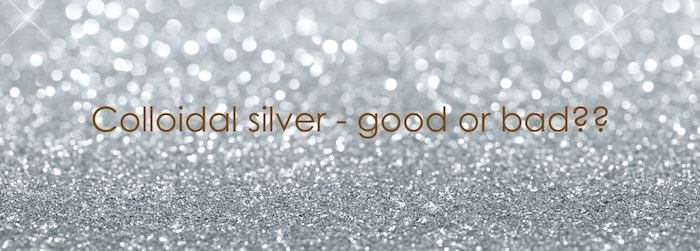Todays post is about Colloidal Silver.
Recently a colleague and I were discussing the use of colloidal silver for health. I realised that I had not come across any health related articles on this product, so I have done some research.
There are very few medical articles written about health benefits of colloidal silver. I was unable to find any published scientific studies advocating the ingestion of colloidal silver as a health remedy. Most scientific or medical articles I found did not support the use of this substance.
(Sources – www.healthline.com, www.webmd.com, www.tga.gov.au, www.ncbi.nlm.nih.gov.
In fact the Australian Food and Drug Administration have issued a warning in regards to colloidal silver.
“There are no products containing colloidal silver approved for marketing in Australia. With the exception of registered topical silver preparations, there is no evidence to support the safety or efficacy of silver regardless of its form or method of manufacture. In addition, silver has no known nutritional benefit and its well-defined toxicity can occur with all forms of the metal, including silver salts and colloids…… Patients seeking information on claimed benefits of colloidal silver should be advised of the lack of evidence for therapeutic benefit and the potential for toxicity associated with colloidal silver preparations.”
So what is it?
Colloidal silver is the term used to describe tiny particles of silver suspended in a liquid. The size of the silver particles in the liquid can vary; some are so tiny that they are referred to as “nanoparticles.” The solution can be found in various strengths, depending on how much silver it contains.
Before modern antibiotics were developed, it was used as an all-purpose remedy for various infections and illnesses.
Recently, it has experienced a revival in popularity. Those who use colloidal silver take it as a dietary supplement or apply it directly to their skin.
How is it meant to work?
It’s unknown exactly how colloidal silver works. However, research suggests that it attaches to proteins on the cell walls of bacteria, damaging their cell membranes.
Silver ions are released from the silver particles when they come into contact with moisture. They are considered to be the “biologically active” part of colloidal silver that gives it its medicinal properties.
What are the side effects?
All of us are environmentally exposed to extremely small amounts of silver every day. It’s present in very tiny amounts in drinking water, the food supply and even the air we breathe. The amount in the environment is considered to be quite safe.
The environmental and health risks of silver nanoparticles are not well understood, given that nanoparticles are able to cross the blood-brain barrier.
Ingesting colloidal silver is generally considered unsafe, possibly leading to a condition known as argyria.
Argyria (ahr-JIR-e-uh) presents as a blue-grey discolouration of the skin, eyes, nails and gums. Argyria doesn’t usually pose a serious health problem. However, it doesn’t go away when you stop taking silver products.
You are most at risk of developing argyria if you’re regularly ingesting silver or work in a job that exposes you to large amounts of silver.
It’s not clear how much silver may be harmful, but it can build up in your body’s tissues over months or years. Soluble silver compounds are also capable of accumulating in small amounts in the brain and in muscles
Rarely, excessive doses of colloidal silver can cause possibly irreversible serious health problems. These include kidney damage and neurological problems such as seizures.
Applying colloidal silver to your skin is considered less risky than ingesting it.
There are however, TGA approved therapeutic goods containing presentations of silver that remain appropriate, for example, topical silver nitrate for neonatal conjunctivitis or silver sulfadiazine for burns.
Well, I hope that helps anyone who was thinking about using colloidal silver for any health concerns. It is certainly not something that we would consider using without seeking professional advice.
Till the next post,
Live clean n prosper

